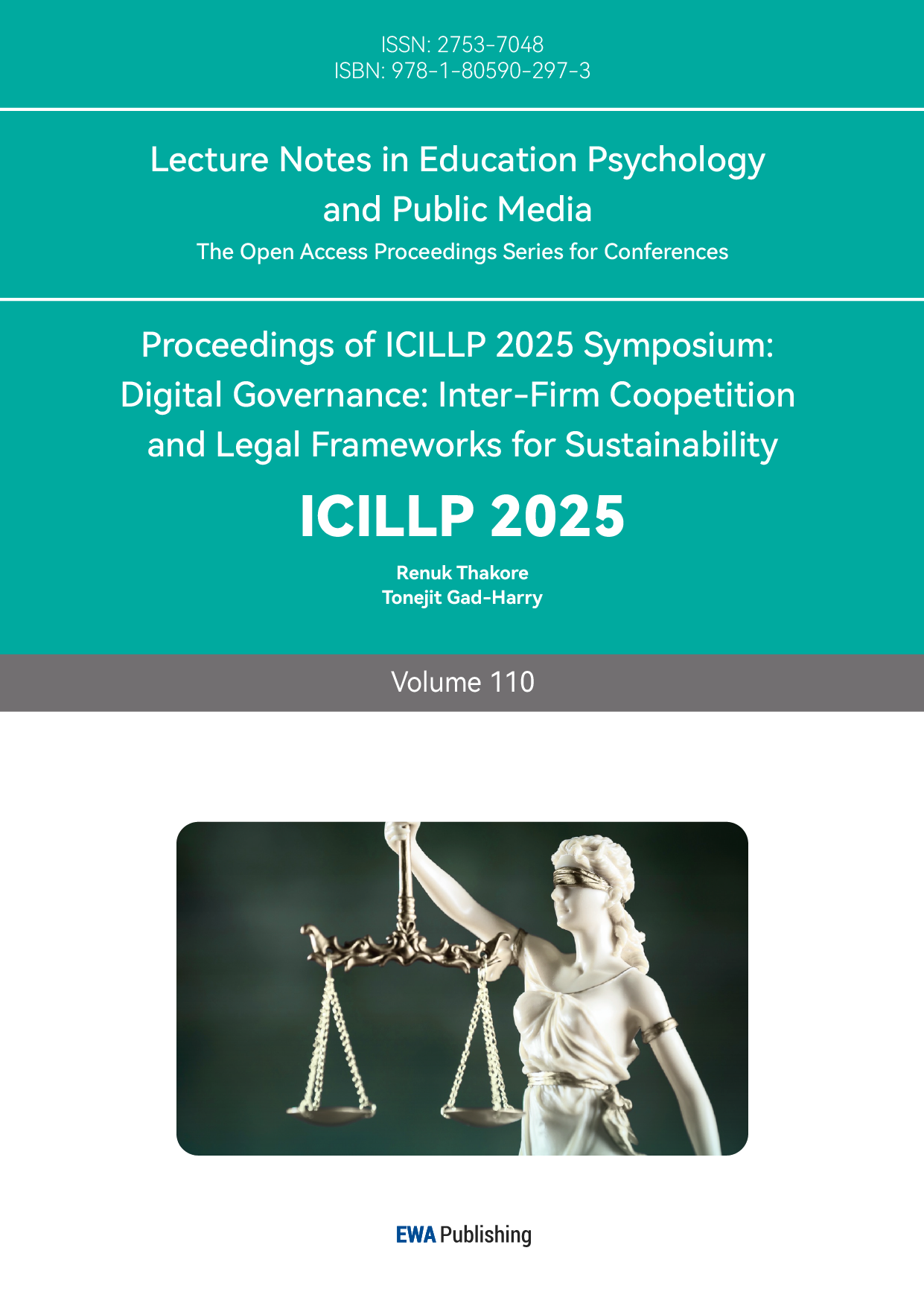References
[1]. Tao Du and Ziwen Ye. (2023) .The Impact of the Economic Sanctions on International Arbitration. International Law Review of Wuhan University, 3, 69-84.
[2]. Jiachen Liu. (2024) .Situational Analysis of The Application Requirements Of Article 12 of China's Anti-Foreign Sanctions Law. Journal of Henan University of Economics And Law, 5, 69-86.
[3]. Peter Wallensteen. (2000). A Century of Economic Sanctions: A Field Revisited Uppsala Peace Research Papers, 1, 1-23.
[4]. Eric De Brabandere and David Holloway. (2016) .Sanctions and International Arbitration. Research Handbook on Sanctions and International Law, 304-329.
[5]. Yonghong Yang and Yuntao Yang. (2023). On Torts and Liability Under Article 12 Of China's Anti-Foreign Sanctions Act. Journal Of International Economic Law, 2, 139-156.
[6]. OHCHR. (2017) Report On the impact of the Gulf Crisis on human rights. Retrieved from https: //www.nhrc-qa.org/storage/news/2018/01/OHCHR-TM-REPORT-ENGLISH.pdf
[7]. Surya P. Subedi. (2021) .Conclusions: The Current Law on Unilateral Sanctions, Remedies Against Unlawful Use Of Such Sanctions And Recommendations, Hart Publishing, 329.
[8]. Georges Van Hecke, (1984). The Effect of Economic Coercion on Private Relationships. Revue Belge de Droit International, 121-130.
[9]. William S. Dodge, (2008) . The Public-Private Distinction in the Conflict of Laws. Duke Journal of Comparative & International Law, 18, 371-394.
[10]. Supreme People's Court, (1998) . Gazette of the Supreme People's Court of the People's Republic of China, Retrieved from http: //gongbao.court.gov.cn/Details/478228621014b9959bed16de65b582.html?sw=
[11]. The Supreme People's Court. (2004) Official Reply of the Supreme People's Court to the Request for Instructions on the Case of Objection to Jurisdiction in the Tort Dispute between Dynasty Engineering Co., Ltd., Orona S. Coop. of Spain, and Guangdong Orona Elevator Co., Ltd., Retrieved from https: //www.faxin.cn/v2/flfg/gjfl/content.html?gid=A118048& highlight=%5B2003%5D%E6%B0%91%E5%9B%9B%E4%BB%96%E5%AD%97%E7%AC%AC%2B31%2B%E5%8F%B7
[12]. The Supreme People's Court. (2005) .Official Reply of the Supreme People's Court to the Request for Instructions on the Objection to Jurisdiction in the Case of the Civil Tort Compensation Dispute between Plaintiff Bestard (USA) Enterprise Co., Ltd. and Defendants Anhui Hotel, He Zongkui, and Zhang Fucheng, and Third Parties Anhui Jinchen Hotel Management Co., Ltd. and the Liquidation Committee of Sino-US Joint Venture Anhui Hotel Co., Ltd., Retrieved from https: //www.faxin.cn/v2/flfg/gjfl/content.html?gid=A108551& highlight=%E7%99%BE%E4%BA%8B%E8%BE%BE%E6%A1%88
[13]. Bank Melli Iran v Telekom Deutschland GmbH, retrieved from https: //curia.europa.eu/juris/liste.jsf?num=C-124/20
[14]. Parsons & Whittemore Overseas Co. v. Societe Generale de L'Industrie du Papier (RAKTA), retrieved from https: //newyorkconvention1958.org/index.php?lvl=notice_display& id=714
[15]. Yongliu zheng.(2013). The Analysis of Public Interest Clauses in Chinese Public Law. Zhejiang Social Sciences, 10, 53-60.
[16]. Anna Segall, (1998). Collective economic sanctions and international humanitarian law — An enforcement measure under the United Nations Charter and the right of civilians to immunity: An unavoidable clash of policy goals? International Review of The Red Cross, 836, 763-784.
[17]. Weiyang tang and Juanqi Cai.(2025) .The Legislation and Practice Of The Anti-Foreign Law. Junhe Law review, Retrieved from https: //www.junhe.com/legal-updates/2673
[18]. Provisions on the Implementation of the Anti-Foreign Sanctions Law of the People's Republic of China, Retrieved from https: //www.gov.cn/zhengce/content/202503/content_7015400.htm



